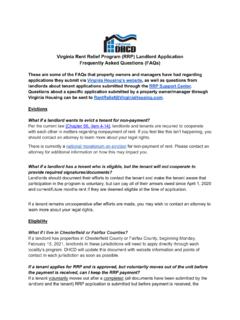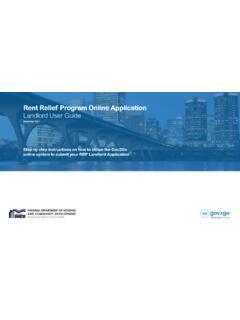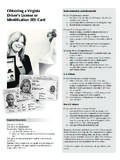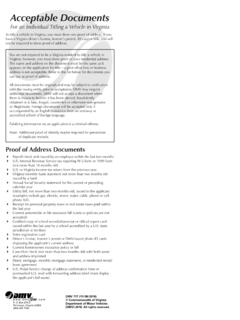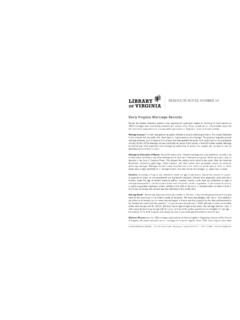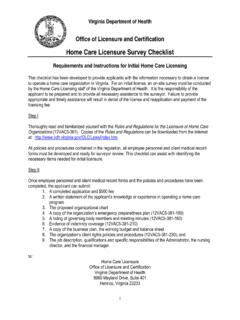Transcription of Virginia Residential Landlord and Tenant Act
1 Virginia Residential Landlord and Tenant Act Effective July 1, 2021 2021 TABLE OF CONTENTS SUBJECT PAGE I. Introduction .. 1 II. Where to get Information and Advice .. 3 III. Text of the Landlord and Tenant Act .. 5 1 Introduction The Virginia Residential Landlord and Tenant Act (VRLTA) handbook provides information on the rights, remedies, and responsibilities of landlords and renters concerning the rental process. Before signing a lease or rental agreement, prospective tenants should read and understand the terms of the lease or rental agreement since it is a legally binding contract. Consulting a lawyer or the Landlord for clarification of the rental agreement is advisable. The VRLTA handbook does not constitute nor is it a substitute for legal advice. The VRLTA, which is located at Sections through of the Code of Virginia , was enacted into law in 1974. The VRLTA establishes the basic rights and obligations of landlords and tenants in Virginia .
2 It also prohibits certain lease clauses. The VRLTA supersedes all local, county, and municipal Landlord and Tenant ordinances that conflict with its provisions. When entering into rental agreements, landlords and tenants may be unaware of important rights and obligations. The VRLTA provides Virginia s legal requirements and limitations on these and other rental issues. The VRLTA covers most Residential rental agreements. A limited number of properties are exempt from the Act. Landlords and tenants not covered by the VRLTA may be entitled to different protections and certain protections and benefits discussed in this handbook may not be available. Apartments: Generally, apartments are covered by the VRLTA regardless of the number of apartment units the Landlord rents (see exemptions to the VRLTA in section Applicability of Chapter; local Authority) Motels/Hotels/Manufactured Homes: Motels and boarding houses are covered by the VRLTA if the Tenant lives in such residence for more than 90 days.
3 Some provisions of the VRLTA protect tenants in manufactured home parks. These are explained in more detail in the Manufactured Home Lot Rental Act. Public Housing and Housing Choice Vouchers (Section 8): Landlord - Tenant relations in public housing, Housing Choice Vouchers or Section 8 housing, and other federally subsidized housing are regulated by the United States Department of Housing and Urban Development (HUD). The VRLTA applies to such rentals as long as it is consistent with federal regulations. Tenants in subsidized housing may gain certain rights from the VRLTA in matters that federal regulations do not cover. For federal regulations, contact your local housing authority or agency, the HUD Area Office in Richmond (or in Washington, , if you live in Northern Virginia ), or the Virginia Poverty Law Center. Single Family Housing: The VRLTA applies to most single-family dwellings subject to a rental agreement (see exemptions to the VRLTA in section Applicability of Chapter; local Authority).
4 2 Section of the Code of Virginia contains the civil remedy and procedure provisions for the duty of landlords and managing agents regarding visible mold. In recent years, the VRLTA has seen significant changes. For example, as of July 1, 2020, a Landlord must include with a written lease the Statement of Tenant s Rights and Responsibilities, which is available on the Department of Housing and Community Development (DHCD) website. The website also has the accompanying Acknowledgement Form, a similar document for residents of Manufactured Home Parks, two sample termination notices for landlords, and other additional information required to be posted by law. In 2021, there were further changes to Virginia s Landlord - Tenant laws. Many of these changes and associated Tenant protections were tied to the Governor s Declared State of Emergency due to the COVID -19 pandemic; those provisions are not included in this handbook, as they expired on June 30, 2021.
5 However, several provisions outlasted the state of emergency and therefore remain active. One such provision states that a Tenant who missed any rent payment during the Governor s Declared State of Emergency may seek a 60 day continuance (or postponement) of an unlawful detainer action if the Tenant appears on their court date and provides written proof that they were affected by the Emergency. This provision expires September 29, 2021. Other changes in 2021 include provisions regarding unlawful evictions/diminution of service, a one-year extension of the 14 day notice of pay or quit , a temporary requirement to include payment plans for some tenants, and changes regarding right of redemption and a Landlord s acceptance of rent with reservation. Furthermore, certain provisions enacted in 2021 have different application depending on how many units (or percent ownership in units) a Landlord owns. The Virginia General Assembly may amend the VRLTA during any legislative session.
6 This handbook includes all amendments to the VRLTA effective as of July 1, 2021 3 Where to get Information and Advice There are public and private sources of assistance, in addition to the courts, to which landlords and tenants may turn. Some local organizations provide services such as dispute mediation, counseling, and low-cost legal advice. Although only the courts can enforce rights and responsibilities, the following organizations may be able to help resolve disputes, provide basic information, or give legal advice: Alexandria Department of Housing Landlord - Tenant Relations 421 King Street, Suite 215 Alexandria, VA 22314 Telephone (703) 746-4990 Fairfax County Department of Cable Communications and Consumer Affairs* 12000 Government Center Parkway, Suite 433 Fairfax, VA 22035 Telephone (703) 222-8435 TTY: 711 ( Virginia Relay) Online complaints *Fairfax County maintains a Tenant - Landlord Commission within this office. This office does not conduct telephone counseling but takes written complaints and produces and distributes a Tenant and Landlord booklet specific to Fairfax County at no cost to consumers.
7 The Virginia Fair Housing Office Perimeter Center 9960 Mayland Drive Richmond, Virginia 23233 Telephone (804) 367-8530 Toll Free: (888) 551-3247 TDD: 711 ( Virginia Relay) Email: Any person who believes they have been discriminated against in the rental of a home or a manufactured home lot should contact the Virginia Fair Housing Office. 4 The Virginia Poverty Law Center 919 East Main Street, Suite 610 Richmond, VA 23219 Telephone 804-782-9430 The Virginia Poverty Law Center provides information and assistance on Landlord and Tenant issues. Virginia Legal Aid Central Intake line: 1-866-534-5243 Central Intake will direct callers to the appropriate local resources, and can provide an attorney in certain circumstances. Virginia Legal Aid also has several self-help forms that can be accessed at Eviction Legal Helpline 1-833-NoEvict This hotline provides services for tenants in the process of being evicted or at risk of eviction. Stay Home Virginia Stay Home Virginia is a site supported by Virginia Housing and provides information and resources for landlords, tenants, and homeowners impacted by the COVID-19 pandemic.
8 5 Code of Virginia , Title , Property and Conveyances Chapter 12 Virginia Residential Landlord and Tenant Act Article 1. General Provisions. Definitions. As used in this chapter, unless the context requires a different meaning: "Action" means any recoupment, counterclaim, setoff, or other civil action and any other proceeding in which rights are determined, including actions for possession, rent, unlawful detainer, unlawful entry, and distress for rent. "Application deposit" means any refundable deposit of money, however denominated, including all money intended to be used as a security deposit under a rental agreement, or property, that is paid by a Tenant to a Landlord for the purpose of being considered as a Tenant for a dwelling unit. "Application fee" means any nonrefundable fee that is paid by a Tenant to a Landlord or managing agent for the purpose of being considered as a Tenant for a dwelling unit. "Assignment" means the transfer by any Tenant of all interests created by a rental agreement.
9 "Authorized occupant" means a person entitled to occupy a dwelling unit with the consent of the Landlord , but who has not signed the rental agreement and therefore does not have the financial obligations as a Tenant under the rental agreement. "Building or housing code" means any law, ordinance, or governmental regulation concerning fitness for habitation or the construction, maintenance, operation, occupancy, use, or appearance of any structure or that part of a structure that is used as a home, residence , or sleeping place by one person who maintains a household or by two or more persons who maintain a common household. "Commencement date of rental agreement" means the date upon which the Tenant is entitled to occupy the dwelling unit as a Tenant . "Community land trust" means a community housing development organization whose (i) corporate membership is open to any adult resident or organization of a particular geographic area specified in the bylaws of the organization and (ii) board of directors includes a majority of members who are elected by the corporate membership and are composed of tenants, corporate members who are not tenants, and any other category of persons specified in the bylaws of the organization and that: 1.
10 Is not sponsored by a for-profit organization; 2. Acquires parcels of land, held in perpetuity, primarily for conveyance under long-term ground leases; 3. Transfers ownership of any structural improvements located on such leased parcels to the Tenant ; and 6 4. Retains a preemptive option to purchase any such structural improvement at a price determined by formula that is designed to ensure that the improvement remains affordable to low-income and moderate-income families in perpetuity. "Damage insurance" means a bond or commercial insurance coverage as specified in the rental agreement to secure the performance by the Tenant of the terms and conditions of the rental agreement and to replace all or part of a security deposit. "Dwelling unit" means a structure or part of a structure that is used as a home or residence by one or more persons who maintain a household, including a manufactured home, as defined in "Effective date of rental agreement" means the date on which the rental agreement is signed by the Landlord and the Tenant obligating each party to the terms and conditions of the rental agreement.

